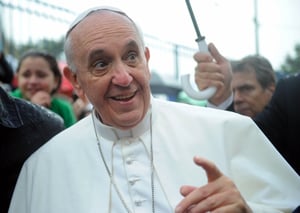Pope Francis announced the renewal of a sweeping initiative and condemned "false prophets" as "snake charmers" and "charlatans" in his 2018 Lenten address this past Tuesday. The Pope went on to recommend prayer, almsgiving, and fasting as the antidotes to these toxic influences.
His message drew inspiration from the gospel of Matthew, “Because of the increase of iniquity, the love of many will grow cold” (Mt 24:12). Emphasizing transformation in his address, the Pope cited some obstacles that we often encounter.
He first warned against false prophets, saying, "They can appear as "snake charmers" who manipulate human emotions in order to enslave others and lead them where they would have them go." He identified some "snake charmers" as momentary pleasures, wealth, and self-isolation from God.
Pope Francis also identified false prophets as “charlatans”, who seemingly provide quick and easy ways to avoid suffering, but really prolong and intensify our misery. He cited drugs, disposable relationships, and a thoroughly “virtual” existence online as examples. The Pope claimed, "These swindlers, in peddling things that have no real value, rob people of all that is most precious: dignity, freedom and the ability to love."
Lastly, the Pope warned against the coldness of our own hearts. He described several signs of a cold heart: "selfishness and spiritual sloth, sterile pessimism, the temptation to self-absorption, constant warring among ourselves, and the worldly mentality that makes us concerned only for appearances." Pope Francis stated that a cold heart had no room for charity, and that it, "leads to violence against anyone we think is a threat to our own 'certainties': the unborn child, the elderly and infirm, the migrant, the alien among us, or our neighbor who does not live up to our expectations."
To combat these evils, the Pope recommended three penitential practices: prayer, almsgiving, and fasting. "By devoting more time to prayer," he said, "we enable our hearts to root out our secret lies and forms of self-deception, and then to find the consolation God offers." By giving alms, the Pope said we would be set free from greed and able to "regard our neighbor as a brother or sister." Lastly, he claimed that fasting provided us an opportunity for growth, saying, "it revives our desire to obey God, who alone is capable of satisfying our hunger."
At the closing of his address, Pope Francis expressed his desire for each of us to approach the Lenten season with joy and enthusiasm. He also mentioned the “24 Hours for the Lord” initiative. A program that asks at least one church in each diocese to remain open for 24 hours to offer both Eucharistic adoration and sacramental confession at some point during the Lenten season. Check with your local archdiocese for participating parishes.
